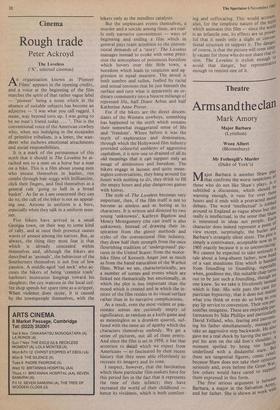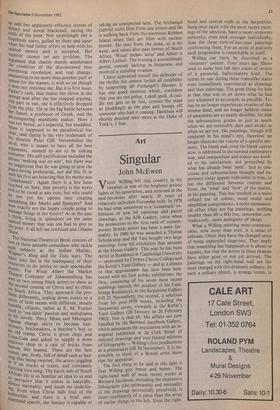Theatre
Arms and the clan
Mark Amory
Major Barbara (Lyttelton) Woza Albert (Bloomsbury) Mr Fothergill's Murder (Duke of York's)
Major Barbara is another Shaw Pia); that confirms the worst suspicions °f those who do not like Shaw's plays. It is subtitled a discussion, which should be warning enough, it runs for over three, hours and it ends with a protracted mora debate. The word 'intellectual' is lobbedJ around in England as vague abuse but this really is intellectual, in the sense that Shay'. is interested in ideas not people. Each r character does indeed represent a point view except, surprisingly, the butler O.° Barbara's strangely silent sister. The plot is simply a contrivance, acceptable now as 111 1905 exactly because it is so unconvincing. We cannot be expected to take seriously tale about a long-absent father, now' heed of a vast munitions firm which is hand from foundling to foundling, esPeciallY when, goodness me, this suitable chap turrios out to be just such a foundling, though 11u , one knew. So we take it frivolously instea r which is fine. His wife puts the case fa. patrician hypocrisy, that it does not matte what you think or even do so long as Y°u r pay lip service to convention. Their son Per- sonifies smugness. These are enjoyable Per formances by Sian Phillips and particulartY David Yelland, who, fearing and patrornso ing his father simultaneously, managesito take an aggressive step backwards. He 31,0 gave me a real shock by having the nerve `„ put his arm on the old lion's shoulder, moment spoiled by being too hea13,,)t t underlined with a disdainful stare. 11u,, these are tangential figures, comic relics because Shaw does not take their opint°11 seriously and, even before the Great War' few others would have cared to support them expressed in this form. The first serious argument is between Barbara, a major in the Salvation Artri.Yh' and her father. She is shown at work wit
an odd but apparently effective system of debate and moral blackmail, saving the souls of the poor. Not surprisingly she is hopelessly naive, gulled by them and upset When her bad father offers to help with his tainted money and is accepted. Her superior cannot see any problem. The argument that charity merely ameliorates the condition of the discontented thus
Preventing revolution and real change, amounting to no more than another puff of ?Plum for the masses, is with us yet though it does not convince me. But it is first issue, Father's cash, that makes her throw in the ,sP°Rge and after she has stopped arguing, ,.`Itie Part or not, she is effectively dropped from the play. On to the big battle between her fiance, a professor of Greek, and the all-conquering munitions maker. Here I Was not bored, as I expected, but muddled. Shaw is supposed to be paradoxical but clear, and clarity is the very trademark of his director Peter Gill. Nevertheless the devil, who is meant to have all the best arguments, seemed to me to be talking nonsense. His self-justification included the Phrase 'making war on war', but there was no suggestion that he was going to arm the Peace-loving proletariat, nor did this fit in With his first act boasting that his motto was Unashamed'. Again there is a live issue touched on here, that poverty is the worst evil to be cured at any cost; but why could evil to put his talents into creating hething like Marks and Spencers? And w exactly are the happy couple going to manage things in the future? As in the past I think, living in splendour on the same the money that was too bad to give to h e Poor. It all left me confused and I blame Shaw.
The National Theatre of Brent consists of t w° or three amiable comedians who tackle such subjects as the Indian Mutiny, baPer's Ring and the Zulu wars. The basic joke lies in the inadequacy of their resources to do justice to such spectacular events. For Woza Albert the Market Theatre Company of Johannesburg has sent us two young black actors to show us the second coming of Christ and its effect bjSouth Africa. They approach the pro- eM differently, scaling down events to a .series of little scenes with different, mostly Illunble, citizens, rather as E. M. Forster Used to 'tea-table' passion and melodrama ;14 his novels. Percy Mtwa and Mbongeni gelna change shirts to become hair- dressers, brickmakers, a butcher's boy or an old tramp. Christ is given chips and rea.-Cola and asked to supply a more aelous shop or a rain of bricks from heaven like manna. These are the best scenes, gay, lively, full of detail such as buz- zing flies being swatted, the actors joggling If on trucks or trains, and constantly .ursting into song. The harsh side of South Pk_ frican life is so familiar an idea to us and :°1 Pervasive that it comes in naturally, most inevitably, and needs no underlin- ng• Even when Christ falls foul of the authorities and there is a brief anti- apartheid speech, the fantasy is capable of
taking an unexpected turn. The Archangel Gabriel wafts Him from one prison and He is walking back from the notorious Robben Island when they get Him with nuclear bombs. He rises from the dead, as is his wont, and raises also past heroes of South Africa. 'Woza' means 'arise' and Albert is Albert Luthuli. The evening is astonishingly genial, entirely lacking in bitterness and received a standing ovation.
I have appointed myself the defender of the thriller but cannot forfeit all credibility by supporting Mr Fothergill's Murder. It has one good moment which, confident that you are not going, I shall spoil. A cud- dly toy gets to its feet, crosses the stage as ploddingly as the plot and bumps off someone who had it coming. Darkness will shortly descend once more at the Duke of York's, I fear.















































 Previous page
Previous page